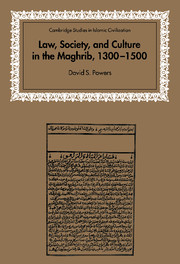Book contents
- Frontmatter
- Contents
- List of figures and tables
- Preface
- Introduction
- 1 Kadijustiz or Qāḍi-Justice? A Paternity Dispute from Fourteenth-Century Morocco
- 2 From Almohadism to Mālikism: The Case of al-Haskūrī, the Mocking Jurist, ca. 712-716/1312–1316
- 3 A Riparian Dispute in the Middle Atlas Mountains, ca. 683-824/1285–1421
- 4 Conflicting Conceptions of Property in Fez, 741–826/1340–1423
- 5 Preserving the Prophet's Honor: Sharīfism, Sufism, and Mālikism in Tlemcen, 843/1439
- 6 On Judicial Style: Two Fatwās on Tawlīj (ca. 880/1475)
- Conclusion: The Muftī
- Bibliography
- Index of Qur'ānic Verses
- Index of Prophetic Ḥadīth
- Index of Names
- Subject index
2 - From Almohadism to Mālikism: The Case of al-Haskūrī, the Mocking Jurist, ca. 712-716/1312–1316
Published online by Cambridge University Press: 05 July 2014
- Frontmatter
- Contents
- List of figures and tables
- Preface
- Introduction
- 1 Kadijustiz or Qāḍi-Justice? A Paternity Dispute from Fourteenth-Century Morocco
- 2 From Almohadism to Mālikism: The Case of al-Haskūrī, the Mocking Jurist, ca. 712-716/1312–1316
- 3 A Riparian Dispute in the Middle Atlas Mountains, ca. 683-824/1285–1421
- 4 Conflicting Conceptions of Property in Fez, 741–826/1340–1423
- 5 Preserving the Prophet's Honor: Sharīfism, Sufism, and Mālikism in Tlemcen, 843/1439
- 6 On Judicial Style: Two Fatwās on Tawlīj (ca. 880/1475)
- Conclusion: The Muftī
- Bibliography
- Index of Qur'ānic Verses
- Index of Prophetic Ḥadīth
- Index of Names
- Subject index
Summary
Do not make game of God's revelations.
(Q. 2:231)The person who will receive the most severe punishment on the Day of Resurrection is the scholar whose knowledge did not benefit him.
(prophetic ḥadīth)Avert the ḥudūd punishments in cases of uncertainty.
(prophetic ḥadīth)The case analyzed in chapter one dealt with an alleged sexual union between ʿAli b. Abi al-culāʾ, a distinguished member of his Community, and a female slave named Tāwatarā, who belonged to ʿAlī's daughter. ʿAli had no legal training, and because of his unfamiliarity with the doctrine of shubha, he believed that he had committed zinā, or fornication. His ignorance – and that of others – played an important role in the case. Our attention was primarily focused on the qāḍī, who was called upon to weigh two conflicting versions of the facts. He demonstrated his skills as a Jurist through his handling of Māliki legal doctrine and the rules of judicial procedure, even if his treatment of the legal issues was driven by palpable but unidentified extra-legal issues.
The case to be examined in this chapter is in one respect similar to that in chapter one: the Charge is fornication. But the defendant, al-Haskūrī, was accused of engaging in sexual relations with his former wife after having repudiated her on three occasions. More important, al-Haskūrī was not a layman but a distinguished Jurist. a
- Type
- Chapter
- Information
- Law, Society and Culture in the Maghrib, 1300–1500 , pp. 53 - 94Publisher: Cambridge University PressPrint publication year: 2002



